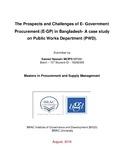| dc.contributor.advisor | Kaiser, M. Shamim | |
| dc.contributor.author | Hossain, Sazzad | |
| dc.date.accessioned | 2018-02-07T02:48:45Z | |
| dc.date.available | 2018-02-07T02:48:45Z | |
| dc.date.copyright | 2016 | |
| dc.date.issued | 2016-08 | |
| dc.identifier.other | ID 15282008 | |
| dc.identifier.uri | http://hdl.handle.net/10361/9413 | |
| dc.description | This dissertation is submitted in partial fulfilment of the requirements for the degree of Masters in Procurement and Supply Management, 2016. | en_US |
| dc.description | Cataloged from PDF version of dissertation. | |
| dc.description | Includes bibliographical references (pages45-46). | |
| dc.description.abstract | Procurement is the acquisition of goods, services or works from an outside external
source and performance of Services by any contractual means. Public procurement
means procurement using public funds. Public sector organizations acquire goods,
services and works from third parties. The system or process of public procurement in
Bangladesh has been evolved, modified and developed over time. Under the primary
legislation PPA 2006, the Public Procurement Rules 2008 was framed and issued, which
replaced the Public Procurement Regulations 2003 of purchasing, hiring or obtaining of
goods, works or services by any contractual means. Corruption and poor governance
are impeding Bangladesh's efforts to reduce its massive poverty by reducing economic
growth and lowering the achievement of social objectives. Electronic procurement
makes public contracting more accessible, more secure and more efficient. Through the
web interface, procurement information becomes accessible and competition and
transparency are enhanced - making collusive bidding difficult.Implementation of e-Government Procurement will supplement the present government's
vision for building a Digital Bangladesh by 2021. The idea of a virtual bidding process
could save more than 15% of the government's procurement costs, according to a World
Bank study and it becomes easier to eradicate corruptions from the country. As the
country marching forward for “Digital Bangladesh”, introducing the system of submitting
the tender over internet is a very positive step.Objective of this paper is to identify and discuss the e-Government Procurement
prospects and challenges and recommends measures to be adopted in public
procurement system in Bangladesh. For this purpose a Questionnaire survey has been
conducted in PWD to gather primary data. In addition, Key Informant Interview has been
conducted to collect invaluable opinions of procuring entity; their perception regarding
the impact of e-Procurement, the reasons behind and suitable suggestions to overcome
the negative impacts.It was found from the study that for e-procurement solutions to be successful PWD
needs to implement change in its traditional procurement practice through strong
leadership, upper management buy-in, cultural change, and technological infrastructuralchange and also through awareness and motivation of the prospective tenderers and
internal users of the system. The study also revealed that by successful adaptation of e-
GP, PWD could achieve transparent, fraud & corruption free, more accountable, time
and cost efficient more improved decision making in its procurement process. Thus by
obtaining the benefits and prospective performance result of the e- GP system, the
paper-based system can be replaced by e-GP. In Bangladesh, it can be a very effective
tool to ensure good governance in the public procurement.
From the findings of the study, we recommend that PWD needs Strategic Planning to
integrate e-GP in its procurement practices. Short, mid and Long term planning and
review and evaluation mechanism needs to be formulated under strategic scope.
Support and active participation of the Senior Officers will play vital role in the
implementation of the system. So, buy-in of the upper management is a must. Strict
compliance to the orders and directives of the top management by the field offices need
to be secured. Good knowledge about Public Procurement Act 2006 (PPA 06) and
Public Procurement Regulations „2008 (PPR 08) need to be established among the
procurement practitioners. Compatible ICT infrastructure is to be confirmed in every
offices of the organization. PWD s existing capacity need to be re-assessed and plan
accordingly. Separate dedicated and competent e-GP Cell for providing support to the
users on 24/7 basis is required to establish. Training/workshop/good practice sharing
programmes are needed to enhance and develop capacity of the suppliers or
contractors on e-GP. | en_US |
| dc.description.statementofresponsibility | Sazzad Hossain | |
| dc.format.extent | 50 pages | |
| dc.language.iso | en | en_US |
| dc.publisher | BRAC University | en_US |
| dc.rights | BRAC University dissertations are protected by copyright. They may be viewed from this source for any purpose, but reproduction or distribution in any format is prohibited without written permission. | |
| dc.subject | e-GP | en_US |
| dc.subject | Procurement | en_US |
| dc.subject | Bangladesh | en_US |
| dc.subject | PWD | en_US |
| dc.subject | Public works | en_US |
| dc.title | The prospects and challenges of E- Government Procurement (E-GP) in Bangladesh- a case study on Public Works Department (PWD). | en_US |
| dc.type | Dissertation | en_US |
| dc.contributor.department | BRAC Institute of Governance and Development, BRAC University | |
| dc.description.degree | M. Procurement and Supply Management | |

